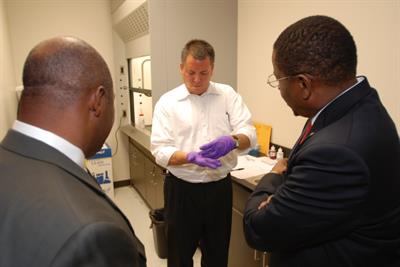Claflin University, City of Orangeburg Forensic Lab Receives Award for Joint Effort
Jul 22, 2014
 Claflin University and the City of Orangeburg Department of Public Safety shared a 2014 South Carolina Municipal Association Award at its annual event in July.
Claflin University and the City of Orangeburg Department of Public Safety shared a 2014 South Carolina Municipal Association Award at its annual event in July.
The award was presented to Claflin University and the City of Orangeburg as a result of the unique partnership developed between the University’s Forensic Science Laboratory and the Orangeburg Department of Public Safety. Officials accepted the award during the association’s 74th annual meeting in Charleston.
“We are pleased to share this recognition with the City of Orangeburg and the Department of Public Safety,” President Henry N. Tisdale said. “This is strong indication of the impact we are making in reducing crime and enhancing the quality of life in our community.”
Orangeburg Mayor Michael Butler expressed his appreciation for the award and the city’s successful partnership with Claflin and the Department of Public Safety.
“I am really appreciative that we can partner and we can turn around DNA evidence in a timely fashion,” Butler said. “We don’t have to send it to SLED anymore and we can do it right here at the forensic lab and ... offer our services to other agencies in this county.”
He said he is excited that Claflin is offering forensic studies so students can major in it and get hands-on training at the in-house forensics lab.
“I am happy we are the only ones in the state to have this,” Butler said.
The city won in the public safety category. Twenty-six cities and towns submitted their projects and initiatives.
“The recognition validates our commitment to reducing crime in our community,” Orangeburg City Administrator John Yow said. “The willingness of Claflin University to partner with the city really allowed the forensic lab to come to fruition. We appreciate the ‘town and gown’ relationship that we share.”
In 2004, Orangeburg and Claflin University forged the partnership to improve forensic laboratory services in hopes of reducing crime in the area. Officials recognized that forensic evidence was not being processed quickly enough, causing a backlog of cases
Members of the state’s congressional delegation secured much of the funding for the full-service forensics lab at Claflin. More than $1 million was spent to renovate existing space and buy equipment for the state-of-the-art facility. The lab opened in November of 2010.
The city employs two crime scene investigators, a forensic chemist and an evidence technician for the lab. Claflin employs two full-time staff members for the facility, which today is used by 17 municipalities, four counties and several state agencies. More than 4,000 cases have been processed at the lab so far, often with results returned in a week.
As the lab processes the DNA, it creates a profile in a local database to generate police investigation leads and to help identify suspects. Soon, officials hope the laboratory will receive additional accreditation that will allow it to analyze more serious crimes and a greater number of cases.
The MASC initiated the Achievement Awards in 1987 to recognize and encourage innovations and excellence in local government.
The lab also received the International Association of Chiefs of Police’s August Vollmer Award for Excellence in Forensic Science in 2010.
Read the original story from The Times and Democrat here.
-
About the Orangeburg Department of Public Safety and Claflin University Forensic Laboratory
The concept for the forensic lab was developed after a study found that a significant portion of the violent crimes committed in the state were associated with the illegal drug trade.
Local law enforcement officials said arrested violent drug offenders were not being dealt with quickly enough due to the time it took to process the evidence. That gave rise to repeat offenders who were committing more crimes while out on bond for their initial charge.
As a result of these findings, officials with both the ODPS and Claflin developed a long-term plan for a regional law enforcement forensic laboratory to be completed in several phases.
In 2007, the ODPS initiated a Crime Scene Investigation program while hiring a full-time investigator to process all major crimes scenes. An Automatic Fingerprint Identification System was later procured that allows latent fingerprints lifted at a crime scene to be searched against state and federal databases.
The lab’s gas chromatograph/mass spectrometer (GLC) decreases from years to weeks the wait for drug analysis of suspected substances. The lab also processes DNA evidence.
Divided into two sections, the facility has a fully operational lab as well as a classroom where Claflin students can study the field of forensic science.